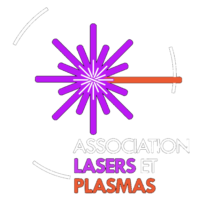PI: Dr Roch Smets LPP (UMR CNRS), Ecole Polytechnique, Palaiseau, France
Status: Performed in April-May 2019.
Not yet published
Summary of the proposal: Deciphering the intricate spatial and energy distributions of magnetic fields, self-generated during high power laser irradiation of a solid target, and of the heat-carrying electron currents, is crucial for a correct description of the energetics of ICF experiments. We have recently shown that, contrary to previous belief based on incomplete hydro-radiative simulation), the B-fields in HEDP conditions are rapidly advected radially along the target surface and compressed over long timescales in the dense and cold part of the plasma onto which the laser energy is deposited. This is important for ICF energetics since, as a consequence, the electrons are weakly magnetized in most part of the plasma flow, and thus, non-locality effects likely play a major role in these conditions.
The objectives of the present proposal are:
1) first, check quantitatively in ICF conditions these conclusions based on experiments conducted at lower energy and verify the already performed simulations at high energy,
2) quantitatively study the reconnection dynamics in ICF conditions, both in planar and non-coplanar conditions between two neighbor B field distributions, a configuration relevant for ICF hohlraums, but also useful to improve our fundamental understanding of this phenomenon.
The main experimental tool which will be used is proton radiography, which is an existing diagnostic capability fielded on the LMJ chamber in the frame of the PETAL+ program. The determination of the plasma energetics will be completed by X-ray measurements (spectrum and spatial distribution of the heated plasma).
